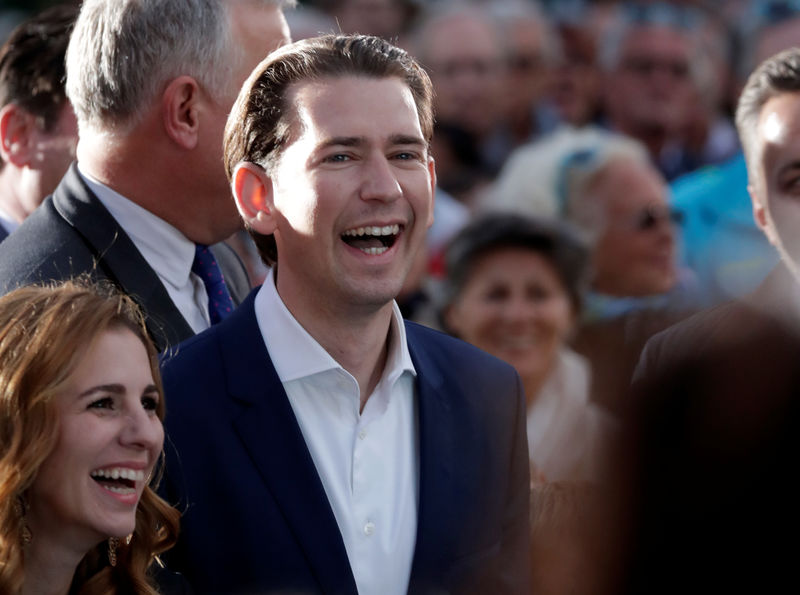By Francois Murphy and Leonhard Foeger
VIENNA (Reuters) - Austria's Greens will only pursue coalition talks with the presumed winner of Sunday's parliamentary election, Sebastian Kurz, if he quickly shows he is serious about a public investment package in environmental measures, their leader said.
Polls have barely budged for months in Austria, where the collapse of Kurz's coalition with the far-right Freedom Party (FPO) after a video sting scandal in May paved the way for the Sept. 29 parliamentary vote.
Kurz's People's Party (OVP) is widely expected to win, meaning he would be tasked with forming a coalition that has a majority in parliament. Usually there are exploratory talks with various parties at first, and one option for Kurz will likely be a three-way tie up with the Greens and the liberal Neos party.
"I expect it to become clear that Kurz will not be very flexible," Greens leader Werner Kogler said of any initial talks in an interview on Tuesday night, maintaining the skeptical tone that he has adopted throughout the campaign.
But he made clear that with the right concessions a coalition deal was possible between his left-wing party and Kurz, who is widely reviled by the Greens' base.
Kurz's other options will probably be to form another coalition with the far right or an unlikely tie-up with the Social Democrats.
It is important Kurz does not use initial talks to give the impression that he is considering an alliance with the Greens or the Social Democrats while really seeking to resume his alliance with the far right, Kogler said.
"I will try to sound that out, to avoid going into real coalition talks that then turn out not to be serious on the central issues," Kogler said, speaking after a film screening in Vienna's fashionable and well-heeled seventh district.
Asked what those central issues are, Kogler said: "For us it is completely clear - to go on an investment offensive." He did not spell out the specifics.
The Greens' manifesto calls for an end to roughly 3.8 billion to 4.7 billion euros ($4.2 billion to $5.1 billion) in subsidies for fossil fuels like heating oil and diesel, and for the proceeds to be invested in environmental measures like expanding public transport and renewable energy sources.
"I am not sure whether the fossil fuels industry, which thoroughly advises Kurz and has made donations, will have its way. For me, that is an open question," he said.
LESSER EVIL
He also singled out social policy, where Kurz's former coalition government with the far-right Freedom Party capped social benefits, particularly for families with several children. The Greens and Social Democrats say that has increased child poverty in the small, wealthy country.
"We cannot undo everything that has been done. There are always compromises (to be made). That is clear. But to intentionally increase the risk of child poverty and push thousands below the poverty line, something has to be repaired there. Otherwise it won't work. He knows that too," Kogler said.
And while there is little common ground between the two sides, Kogler said it was his party's responsibility to at least try to prevent another coalition between the OVP and FPO, also known by their official colors, turquoise and blue.
"It cannot be ... that 99% of us say turquoise-blue is the worst and there is no willingness to try something else," Kogler said. "I don't think it's very likely, but if we don't try then we are not very credible."
